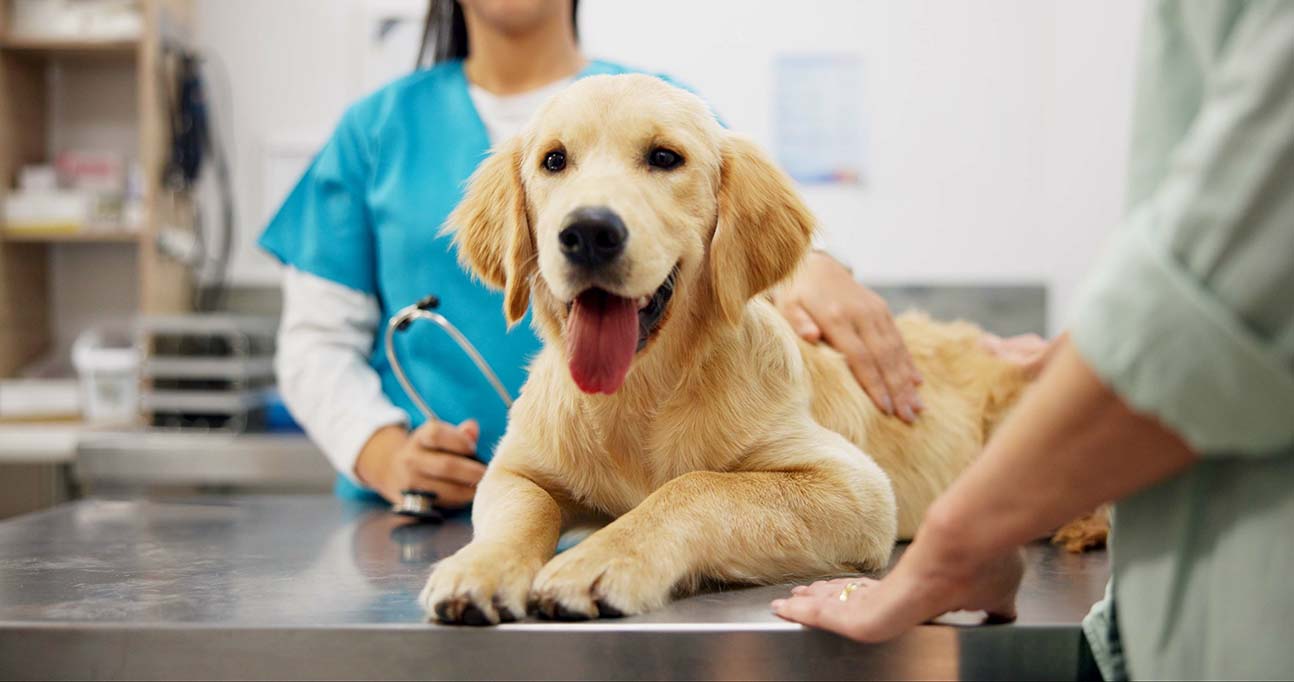Reviewed by Dr. Sarah Yosry
Updated on 29/04/2025
Reading time 4 min.
Overview
Severity: Low
Life stage: All
As a responsible dog owner, your pet’s well-being and good health must be a priority. Proper veterinary check-ups are important in the prevention of diseases, detection of medical ailments at an early stage, and your pet’s overall happiness and activity. How often can you visit the vet, though? The frequency of vet visits relies on your dog’s age, breed, general state of health, as well as their lifestyle. You may be looking for a vet clinic close to you, a veterinary clinic Dubai, or a pet clinic, but checks are key to a long life of good health.
Routine Veterinary Visits by Life Stage
Puppies (0-12 Months)
They need to visit the veterinarian fairly often to see that they are growing well and getting their vaccinations. A standard regimen involves:
• Puppies’ first vet visit: Puppies must be taken for a first vet visit at six to eight weeks of age to monitor their general health, diet, and initial signs of any congenital condition.
• Follow-up visits: Every three to four weeks for regular checkups until they turn sixteen weeks old, receiving all the vaccinations and health tests that are required.
• Vaccinations: These include core vaccinations like rabies, distemper, parvovirus, and hepatitis given at intervals as a measure to induce immunity and avoid serious diseases.
• Deworming: Preventative medication for intestinal parasites such as roundworms and hookworms, which are prevalent in puppies and can lead to digestive as well as general health problems.
• Spaying/Neutering Consultation: This is usually done at six to nine months, as it prevents pregnancy as well as the development of reproductive-related diseases down the line.
As puppies are prone to infections as well as congenital issues, frequent visits to the vet ensure they are properly monitored. A veterinary clinic Dubai will check for diseases at birth, provide proper dietetics, as well as give advice on behavior. Your vet’s early socialization advice as well as puppy-care tips can ensure your puppies become well-adjusted adult animals. Proper vaccination is important since diseases like parvovirus, as well as distemper can kill a dog if not vaccinated. If you are searching for a vet clinic nearby, select a clinic that has expertise in dealing with young animals as well as overall puppy care.
Adult Dogs (1-7 Years)
Once your dog is grown, yearly veterinary visits are required to ensure overall health. A standard checkup at a veterinary clinic normally comprises:
• Physical checkup: The veterinarian will perform a head-to-tail examination to examine the pet for any malformations, such as lumps, skin issues, or any sign of pain.
• Vaccination boosters: Required to ensure continued protection from contagious diseases like rabies, distemper, and leptospirosis that can infect any breed of dog.
• Flea, tick, and heartworm prevention: Preventative measures guard dogs against parasites that can result in serious illness complications including anemia, skin infections, as well as heart disease.
• Dental checkup and cleaning: A professional oral checkup can avert periodontal disease, which otherwise can cause pain, loss of teeth, as well as organ harm if the bacteria reach the bloodstream.
• Nutritional and exercise consultation: Your dog’s diet and activity level will be assessed by the vet, with recommendations made regarding maximizing their overall well-being and weight management.
Adult canines are in better health compared to puppies, yet they need preventive measures to identify possible issues at their earliest stages. Regular check-ups at a veterinary clinic can diagnose early indicators of obesity, allergies, or heart disease. Because dental disease is common among adult canines, dental cleaning regularly is recommended to avoid tartar accumulation as well as infection.
Your veterinarian will also check your dog’s diet as well as his level of exercise, prescribing recommendations for his overall well-being. If you’re looking for a vet Dubai, check if the clinic provides extensive services such as blood work as well as parasite control.
Senior Dogs (7+ Years)
With age, the dog needs to visit the vet increasingly often—once every six months. Senior dogs are predisposed to chronic diseases, thus regular monitoring of their health is a must. A typical vet clinic Dubai visit for an older dog may involve:
• Blood and urine examinations: These examinations are used to pick up early signals of diabetes, kidney disease, or liver impairment, permitting early intervention and management.
• Arthritis evaluation: Senior canines are prone to arthritis, a condition that causes joints to be stiff and painful, necessitating pain management medications and dietary changes.
• Cognitive function assessment: Canine cognitive dysfunction, equivalent to dementia in humans, can develop in older animals, which can impair their memory, sleep, and responsiveness.
• Vision and hearing tests: Dogs can gradually develop loss of eyesight and hearing as they grow older, affecting their daily habits and general well-being.
• Senior dog nutrition changes: A mature dog’s diet must contain the appropriate proportions of protein, fat, as well as joint-support elements, to accommodate their altered metabolism as well as mobility.
Senior canines are at risk of arthritis, diabetes, kidney disease, as well as cognitive decline. Routine visits at a veterinary clinic enable vets to check on such ailments and administer pain management.
Older canines can be advised on their diet and exercise needs to maintain their mobility as well as avoid gaining extra weight. A professional veterinarian close to where I am can provide your older pet with senior programs to keep them active as well as pain-free.
Signs Your Dog Needs Immediate Veterinary Care
Even on a standard checkup regimen, emergencies may occur. Seek veterinary care instantly at a vet clinic nearby if you observe any of the following:
• Sudden weight changes: Sudden weight changes may be a sign of a deeper condition such as metabolic disorders, diabetes, or thyroid issues that need urgent attention.
• Frequent vomiting or diarrhea: Recurring digestive problems can cause dehydration as well as loss of important nutrients, and can be indicative of infection, food allergy, or intestinal obstructions.
• Coughing or difficulty breathing: Breathing issues may be a sign of such major illnesses as pneumonia, heart disease, or allergic reactions that require immediate treatment.
• Loss of coordination or seizures: Neurological signs can be caused by epilepsy, toxin exposure, or brain illness, all of which need urgent veterinary assessment.
• Excessive scratching, hair loss, or irritation: Skin issues can be triggered by allergies, parasites, infections, or autoimmune disorders requiring correct diagnosis and treatment.
• Lack of appetite or lethargy: An alteration in dietary habits or energy state could be a sign of pain, infection, or chronic disease that needs veterinary care.
Dogs hide pain and discomfort well, so pay close attention to any changes in behaviour or body. It may be a sign of underlying sickness if your dog grows aggressive, restive, or becomes lethargic. If you think you are having a medical emergency, head to a veterinary clinic Dubai as soon as possible to avoid complications.
Conclusion
Routine vet visits are key to ensuring your dog stays healthy and happy. If you are looking for a vet clinic, pet clinic, or veterinary hospital, selecting a good one is important for your pet’s health. If you are in Dubai, Modern Vet Hospital provides world-class veterinary services with experienced staff and modern facilities. Book your appointment today to give your pet the finest care.
Share this, choose your platform!
Writen by
Dr.Sarah Yosry
DVM
A product of a rich Australian/Egyptian heritage, Dr. Sarah Yosry stands as a testament to the union of diverse cultures and a shared love for animals.



